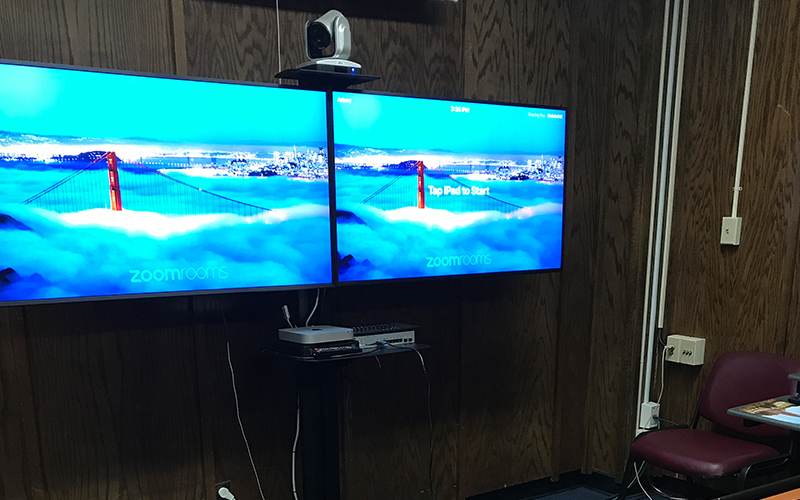
Answering the Call to Ministry Means Transition and Change at Saint Paul
In an ever-changing world, it’s important to keep looking forward and not let the need to keep looking back to the past hold us back.
Those who answer the call to become a minister must be willing to embrace the future good that can come from change, especially as they seek to lead communities of faith into that future.
Transition and change continue to thrive in many ways at Saint Paul School of Theology — from new classrooms equipped with advanced communication technology, to facilitating students’ transition to ministry careers, to celebrating the contributions of outstanding faculty members entering retirement.
Redesigned Classrooms Support Hybrid Course Offerings
Students responding to the call to serve in ministry come from a variety of backgrounds and life circumstances that require varying course delivery needs.
Digital technology is an essential tool that helps Saint Paul meet those needs.
Our recent classroom redesign included an addition expansion of classroom technologies for delivering hybrid and online seminary courses, while the expansion of existing the addition of new classrooms created even more space for welcoming those taking courses in person at our Kansas City and Oklahoma City campuses.
Larger More classrooms and updated communication tools improve Saint Paul’s reach, especially for students taking advantage of the school’s new FLEX schedule. The goal is to make seminary education more convenient and accessible for commuter and out-of-state students by offering a mix of online, hybrid and on-campus courses.
Providing multiple class options benefits Saint Paul students in many ways:
- Saves time and distance
- Lowers the cost of seminary for commuter students
- Lets individual students participate in learning experiences no matter where they are
- Creates a more positive seminary experience for all students
Facilitating Change for Students Called to a Life in Ministry
Seminary students prepare for working in ministry through Contextual Education courses at Saint Paul.
The Contextual Education program includes four parts:
- PLUM Groups introduce students to Contextual Education and are required for students pursuing a Master of Divinity (MDiv) and Master of Arts in Christian Ministry (MACM). Activities include small group discussions on ministry and seminary.
- Ministry Collaboration Groups let students reflect on experience in life and ministry in small groups facilitated by faculty. Topics include Identity and Role in Ministry, Practices of Ministry, The Church and Its Mission and Constructive Participation in Small Groups. Students may also work on case studies, learning goals, written assignments, short readings, self reflection and self evaluation.
- Ministry Settings train students for full-time ministry and are required for PLUM groups and Ministry Collaboration Groups. The student completes a minimum of 4 hours per week, paid or volunteer, and employment or appointment as a part-time pastor qualifies. The Contextual Ed office provides information on employment opportunities, while David Firman and Dr. Jim Brandt can provide info on volunteer opportunities. Students may propose unique Ministry Settings with approval from the Contextual Ed office.
- Spiritual Formation Retreats are day-long gatherings of students, faculty and staff for a time of prayer, learning and fellowship. This activity guides our students as they seek to be formed for ministry, grow in personal and social holiness and deepen a sense of being Christ’s body in this place.
Changing of Faculty with Notable Retirements
Saint Paul colleagues recently gathered for to celebrate the service of two outstanding educators, Dr. Mike Graves and Dr. Harold C. Washington.
Dr. Graves, The William K. McElvaney Professor Emeritus of Preaching and Worship, has prepared generations of church leaders through his numerous preaching courses, guided by a firm belief that preaching has the power to transform people by calling them to be “change agents but also by speaking truth to power.”
Dr. Washington, Professor Emeritus of Hebrew Bible, describes the Hebrew Wisdom literature as a “rich resource for educating leaders in the church,” not just for the practical advice found in books like Ecclesiastes and Proverbs, but as a guide to critical thinking, piety and ethical living.
Are you hearing the call to become a minister? If you’re contemplating this important change in your life, reach out to Saint Paul at 913-725-8289 or contact us online to request additional information.
